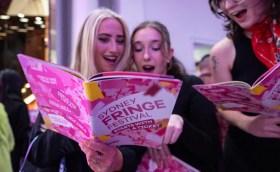Vidya Rajan’s stage adaptation of Looking for Alibrandi brings Melina Marchetta’s much loved 1992 novel to life on stage, offering a fresh perspective on the story of Josephine (Josie) Alibrandi, a 17-year-old Italian-Australian navigating her final year of high school and her relationship with her single mother, distanced father, grandmother and friends.
Set in the 1990s, the play follows Josie as she contemplates her future and grapples with the challenges of adolescence. The narrative unfolds through the lens of three generations of Alibrandi women: Josie, her mother Christina and her grandmother Nonna Katia. The play opens with the tradition of making passata, symbolising the passing down of cultural practices and the weight of family history. (On stage are dozens of crates of tomatoes, kitchen equipment and real cooking. The smell continually pervades the auditorium.)
As Josie navigates her relationships, schoolwork and the discovery of dark family secrets, she confronts the emotional toll of unfulfilled potential, both hers and – more devastatingly – of friends as well as the possibility of breaking the cycle of generational trauma.
While the novel focusses on Josie’s coming-of-age journey, Rajan’s stage adaptation expands the focus to include the experiences of her mother and grandmother. This allows for a deeper exploration of intergenerational dynamics and the impact of cultural heritage on identity.
Josie’s journey is one of self-discovery as she navigates the complexities of adolescence, identity and family expectations. We see her reconciling her aspiration, and the influence of peers, with the realities of her cultural heritage and family expectations. With Christina we observe the challenges of balancing personal desire with the responsibilities of motherhood: sacrifice, resilience and the desire to provide better opportunities for the next generation. Nonna presents traditional values and preserving cultural identity as much as possible in the face of adverse pressure from the dominant white, Anglo Saxon-Protestant Australian culture.
With all characters in the play, not just the Alibrandi women, the play explores sense of belonging, the impact of familial expectations and unspoken histories on personal development. Some of the most amusing sections of the play and some of the most heartrending derive from precisely this tension: individuals not doing what is expected of them.
The stage adaptation is set in diverse locations – kitchen, school yard etc – and director Stephen Nicolazzo and designer Kate Davis have staged the action in drapes with some settings richly detailed (e.g. the kitchen), while others are merely suggestive with minimal stage dressing. It is a credit to the design concept that we are never in doubt where the action is located and the continuity from one scene to the next is flawless and smooth. Three of the six cast play multiple characters and this is a highlight, with the actors moving seamlessly and hilariously between their various characters.
Ashton Malcolm is entertaining as (poison) Ivy and credible as John, while Lucia Mastrantone is side splittingly when she transitions from playing mum to one of Josie’s school friends. Jennifer Vuletic is enigmatic as Nonna and comically austere as Sister Bernadette. Chris Asimos plays Michael Andretti, Josie’s father, and almost convincingly navigates the evolution from estranged parent to caring parent. Awkwardly, the lean text doesn’t give him too much to work with and the transition is necessarily as quick as the blink of an eye. Riley Warner nicely plays Josie’s wannabe knockabout boyfriend Jacob. There is genuine warmth and transparent honesty about Warner’s Jacob, something that is absent from the writing of some of the other characters.
In the lead role, Chanella Macri dominates every scene she is in with quick wit, smooth movement around the stage and impish engagement with the audience, especially when she breaks the fourth wall in both planned and spontaneous ways. The physical juxtaposition of her with some of the other characters, such as with the diminutive Mastrantone, is attention-grabbing, but Macri seems at all times to be fully aware of what her audience might be thinking and how they are reacting and she embraces and works with it.
Daniel Nixon’s sound design often feels out of place, especially in Act 1, with brooding anxious music underscoring scenes that are actually much lighter in mood. However, as the drama of Act 2 unfolds, the design becomes appropriate and reaches a high point as it accentuates Nonna’s shattering reveal. Lighting by Katie Sfetkidis is at all times empathetic to the action and the transitions from one scene to another are quick, decisive and effective.
The play’s text sets up clear contrasts between Act 1 and Act 2 (which is longer): Act 1 seems drawn out and too episodic, while Act 2 maintains an almost relentless pace and builds momentum that maintains and galvanises audience attention.
Read: Performance review: The Birds, Malthouse Theatre
Looking for Alibrandi provides a rich tapestry of perspectives that resonate with contemporary audiences both young and old, and the diverse and large opening night audience frequently laughed and silently shed tears at what unfolded on stage.
Looking for Alibrandi by Vidya Rajan, based on the book by Melina Marchetta
Dunstan Playhouse, Adelaide Festival Centre
Produced by Brink Productions and presented by State Theatre Company South Australia
Originally commissioned by Malthouse Theatre
Original production co-presented by Malthouse Theatre and Belvoir
Director: Stephen Nicolazzo
Set and Costume Designer: Kate Davis
Lighting Designer: Katie Sfetkidis
Composer and Sound Designer: Daniel Dixon
Choreographer/Musician: Rosa Voto
Musician: Renato Vacirca
Dialect Coach: Paulo Bongiovanni
Cultural and Language Consultant: Lucia Mastrantone
Production Manager: Steve Tilling, Lachlan Turner
Stage Manager: Jacinta Anderson
Assistant Stage Managers: Ashlee Scott, Charlotte Welden
Head of Lighting: Hanna Aylett
Head Mechanist: Gifford Trebilcock
Sound Technician: Jackson Price
Radio Technician: Josh Phillips
Cast: Chris Asimos, Chanella Macri, Ashton Malcolm, Lucia Mastrantone, Jennifer Vuletic, Riley Warner
Looking for Alibrandi will be performed until 31 May 2025.






